The Best Retail Accounting Software
We reviewed the most popular retail accounting software on the market and selected our favorites for several different types of retailers. See our results below.
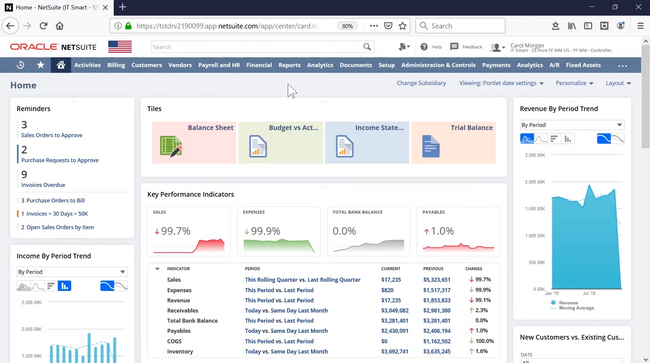
- Hundreds of third-party add-ons available
- Feature sets for multiple industries
- Highly customizable
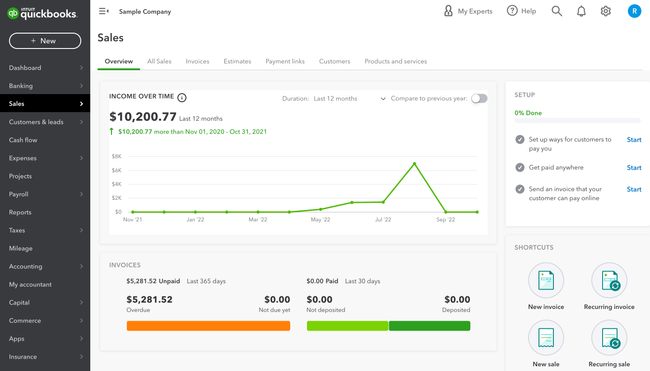
- Customizable invoicing
- Extensive pre-built and custom reports
- Automatic exchange rates
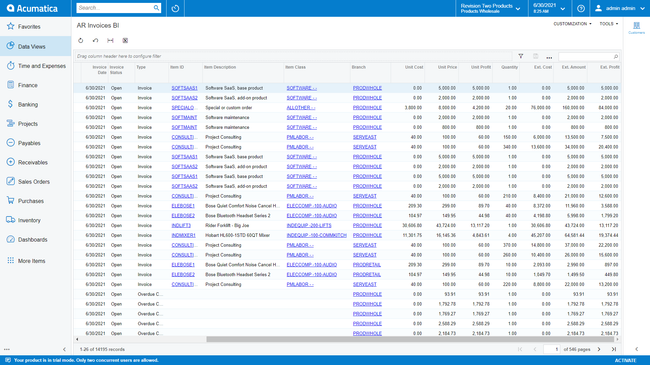
- Open architecture for rapid integrations
- Multi-entity support
- Mobile accessibility
Retail accounting software helps streamline and automate back-office accounting tasks, inventory management, CRM, and reporting. We used our advanced review methodology to pick the top options for all types of retail businesses, from specialty stores to wholesalers.
- NetSuite: Best Overall
- QuickBooks Online: Best for Online Retailers
- Acumatica ERP: Best for Grocery Stores
- Sage Intacct: Best for Multi-Entity Chains
- Xero: Best for Specialty Shops
- Odoo: Best for Convenience Stores
- SAP Business One: Best for Discount Stores
- Oracle Retail: Best for Wholesale Retailers
NetSuite - Best Overall
NetSuite Retail includes industry-specific features tailored for medium to large big box chains. Specifically, its omnichannel support lets you sell from several brick-and-mortar stores, online websites, and call centers all in one system. This versatility helps generate accurate sales reports across all marketplaces, helping you make more informed decisions based on live data.
NetSuite Retail offers an in-store mobile POS system, which saves you the hassle of integrating third-party software. This works with the CRM module, giving you insights into customer details to provide better service and identify trends. These insights allow retailers to draw new customers and keep regulars, boosting overall sales and traffic.
However, due to its extensive features, the system is expensive, starting at around $2,000/month. Because of the price, single-location retailers and small specialty stores are better suited for a smaller accounting system.
QuickBooks Online - Best for Online Retailers
QuickBooks Online integrates with many popular platforms, such as Shopify and Amazon. It supports over 150 currencies, allowing businesses to sell to international customers. This is ideal for online retailers selling globally, as the system automatically handles all the conversions once the transactions are added.
Its inventory module allows owners to track products and access real-time stock levels. It also ensures that physical stock stays synchronized with your online platform, so inventory levels update anytime a sale occurs in-store or online. However, the inventory module is only available in the Plus plan at $99/month, which can be expensive for startups.
Acumatica ERP - Best for Grocery Stores
Acumatica’s warehouse management module supports multiple warehouses and includes lot and serial tracking, which helps find recalled and expired products. Management can use stock turnover data to track inventory fluctuations like fast-moving and obsolete products.
Additionally, Acumatica can help you manage discount policies and complex pricing. These features are important for grocery stores, as there are always new discounts and price fluctuations. It also includes business intelligence tools so companies can analyze sales metrics to see their performance. However, Acumatica is a modular ERP system that allows businesses to choose which features to add. This can inconvenience some who are looking for an all-in-one package.
Sage Intacct - Best for Multi-Entity Chains
Sage Intacct delivers a strong multi-entity financial management module for retailers with several locations or subsidiaries. It automates everything from intercompany transactions to dynamic financial roll-ups across all your stores, saving you the headache of juggling different accounting systems and spreadsheets.
You can drill down into individual store performance, including real-time insights on expenses, revenue, and cash flow. You can also view an entire brand’s profitability at a glance and create multi-location financial reports. With role-based access, store managers will see only their location’s data, while executives get a consolidated view across all chains.
If you operate in different states or even countries, Sage Intacct automatically handles multi-currency conversions and tax rules. So if your US-based company opens a store in Canada, the system tracks the store’s revenue in CAD while consolidating everything into USD.
As an accounting software for retail, Sage Intacct is best for mid-sized and enterprise-level companies. Pricing starts at around $8,500 per year, with an additional $2,880 per extra user.
Xero - Best for Specialty Shops
Xero is a good option for small to midsize specialty retailers, like florists or bookstores, because of its streamlined accounting processes. As a retail accounting software, it features bill tracking, expense claims, and omnichannel integration for all sales channels. Its inventory module has a limit of 4000 products but is effective for specialty retailers with less than that, as users can add items to invoices, track product performance, and see an item’s total stock value on hand.
Its user-friendly interface and clear interface make it easy for owners unfamiliar with accounting software to learn. Also, Xero’s payroll add-on, Gusto, allows retailers to pay employees and automatically file W-2s and 1099s, though it tacks on an extra $40/month plus $6/user/month. It integrates with Xero, storing all the data on one platform for fast payroll reconciliation.
Odoo - Best for Convenience Stores
Odoo’s modular structure allows stores to add more features as needed. Small independent stores looking for standalone financial software can buy Odoo Accounting, which includes invoicing, a double-entry system, and bank synchronization.
Odoo offers many additional apps that expanding stores with multiple locations can use, such as inventory, purchasing, POS, and eCommerce, creating a light ERP system. You can choose which apps to add, which is ideal for convenience retailers that don’t require a full suite of modules from an ERP package. Odoo also has an open-source structure, making it highly customizable so businesses can tailor it to their needs.
SAP Business One - Best for Discount Stores
SAP Business One provides flexibility and multi-location support. The system is a complete ERP solution with POS integration and inventory management. Specifically, we like its strong financial management module, including customized reporting, analytics, automated accounting, and cash flow management features. This is critical for discount stores working with thin profit margins to ensure that all bookkeeping is accurate and that stores operate efficiently.
Its purchasing and inventory management modules are effective for large chains because they can support a large volume of data. Utilized as a retail accounting software, Business One also caters well to brick-and-mortar and online stores, syncing the inventory for both channels. Owners can generate reports that include multiple channels, which can help identify trends and comparisons between them.
SAP Business One is one of the few systems that stores can deploy on-premise or web-based, suiting companies that don’t want a cloud-based solution. However, their pricing is only available when requesting a quote.
Oracle Retail - Best for Wholesale Retailers
Oracle Retail is best for fashion and superstores, with a supply chain management module that fits the needs of large warehouses and inventories. The system includes logistics and allocation, providing management with complete control over the distribution and procurement processes. This ensures that products are delivered nationally and globally on time and to the correct place.
Oracle Retail’s marketing features allow companies to launch digital marketing campaigns, create customer loyalty programs, and provide customer data insights. These features fit well for wholesale stores because, due to their vast infrastructure, they need to reach as many customers as possible.
What is Retail Accounting Software?
Retail accounting software is a system that aims to streamline and optimize key business processes like cash flow tracking, inventory management, and CRM. These features ensure that the bookkeeping is efficient, accurate, and compliant across multiple stores and sales channels.
Midsized and large retailers, like wholesale and grocery chains, can implement an ERP system to provide an all-in-one solution. Smaller retailers, like single-location and convenience stores, may look for a smaller accounting software that is cheaper but includes fewer features.
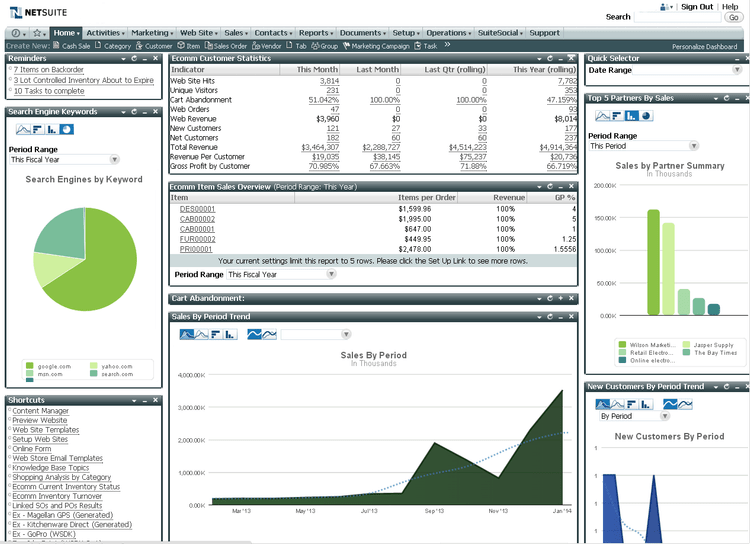
Key Features
- Invoicing and Billing: Generate invoices to ensure accurate and fast payments. Manage outgoing payments for vendors, building management, and utilities.
- Inventory Management: Manage stock levels, set maximums and minimums, and track batch orders in one system. With automatic ordering for popular products, ensure levels are always where they need to be.
- POS integration: Full ERPs can include a POS system to streamline the checkout process. Smaller accounting software can integrate with existing systems to automatically sync data.
- Supply Chain Management: Manage end-to-end supply chain processes, from procurement to delivery. Ensure operational efficiency and extract data from processes.
- OmniChannel Support: Collect data and revenues from all sales channels, including all store locations, websites, and call centers.
- CRM: Set up loyalty programs and gather customer feedback to provide better service in-store and online.
- Reporting: Generate reports on key sales metrics like revenues, expenses, and productivity.
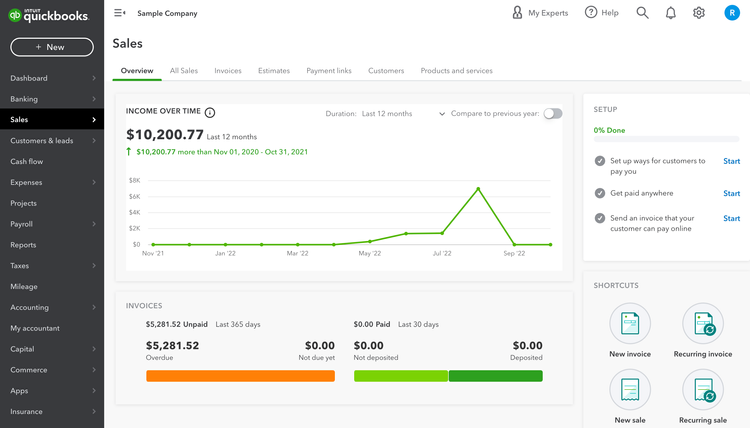
Primary Benefits
Streamlined Back-Office Tasks
Retail accounting software can save businesses several hours a week by automating back-office tasks like invoicing, payment processing, and updating the general ledger. Moving these accounting tasks from manual spreadsheets to a streamlined system makes processes easier, more efficient, and more accurate because of the double-entry system. It also keeps all essential files organized, making it easy to pull up files and past transactions.
Optimized Inventory Control
Having control of inventory is essential for retailers, as too much can cause backstock overflows, and too little can leave customers unsatisfied. Retail accounting software can allow owners to view accurate real-time inventory data from their desktop or mobile devices. Each product can have maximum and minimum levels, ensuring no product goes out of stock and not too many are ordered.
Customer Satisfaction
Retail accounting systems allow wholesalers and other retailers to track distribution to ensure on-time shipment and accurate delivery. This will ensure a positive customer experience which keeps them coming back. Also, CRM modules can help set up loyalty programs for regulars to reward them for being consistent customers. Systems can easily adjust prices for discounts and create coupons, helping drive more sales.
Sales Insights
The retail market is constantly shifting, requiring businesses to adapt and change with it constantly. Accounting software can help retailers be proactive by generating reports on key metrics like revenues and expenses. Visualizing product performance and overall cash flow can help see where different stores are succeeding and where improvements can be made.
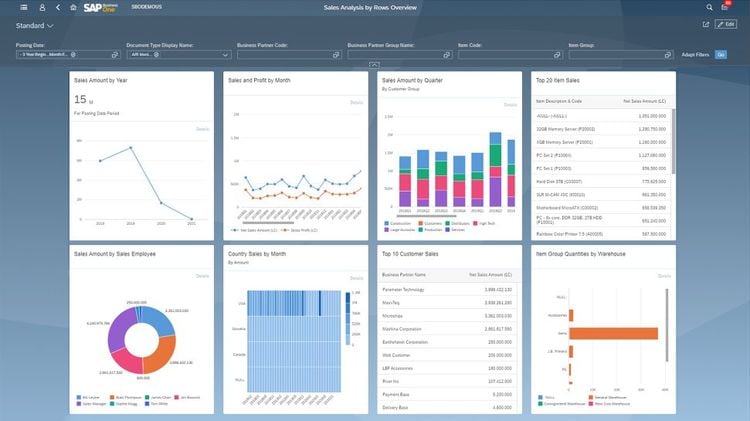
Pricing
For small to midsize businesses, the cost for ERP monthly subscriptions typically ranges between $1,700 to $10,000. However, this is determined based on a number of variables like business size, number of locations, and additional features.
Regular accounting software costs between $0 and $300 monthly. This is for systems like QuickBooks Online and Xero, which lack advanced features like supply chain management but are effective for accounting and inventory control. These are generally used by smaller retailers with fewer than five locations.
















































